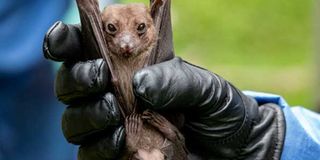Researchers in Uganda find coronavirus in bats, camels

What you need to know:
- Dr Sylvia Baluka, the president of Uganda Veterinary Association, said most diseases that affect human beings originate from animals.
- Dr Baluka said government should provide more funds to strengthen research, monitoring and regulation of veterinary products to prevent these diseases before they spread to people
A research laboratory at Makerere University College of Veterinary Medicine has discovered forms of coronavirus in samples collected from bats and camels in the country.
Addressing a public dialogue in Kampala last week, Prof Denis Byarugaba, the lead research scientist, said they had been doing several tests in the past years that detected the virus in common species that live with people.
“We have analysed 16,000 samples and seen a prevalence of coronavirus at a prevalence of 0.6 per cent,” he said.
Prof Byarugaba said they have screened 500 bats during the current outbreak, and discovered mass coronavirus.
“Through a collaboration with a partner, we were able to isolate mass coronaviruses from bats,” he said.
Prof Byarugaba also said another test on camels from Karamoja Sub-region, which are suspected to have the virus, revealed shocking findings.
“We specifically looked out for coronaviruses in camels. We screened 500 camels and we found 70 per cent positivity in our serological tests,” he said.
Origin
Dr Sylvia Baluka, the president of Uganda Veterinary Association, said most diseases that affect human beings originate from animals.
Dr Baluka said government should provide more funds to strengthen research, monitoring and regulation of veterinary products to prevent these diseases before they spread to people.
Pof Pontiano Kaleebu, the director of Uganda Virus Research Institute, said the coronavirus has been in Uganda for long.
“A number of people have been infected by coronavirus. If you ever got short cold and cough, it could have been due to coronavirus,” Dr Kaleebu said.
He said the virus is in chicken, other birds and animals, adding that it was first discovered in the 1960s.
Prof Kaleebu said the virus is proving deadly because it has just crossed to a new host - humans.
“This type leads to severe infection, it can severely infect your lungs and kidneys. It is more dangerous than the one that has been around,” he said.
Prof Kaleebu said the virus could have mutated to enable it subdue in more hosts.
“Every time a virus multiplies, they keep on changing for them to survive and infect more hosts just like HIV,” he said.
He said majority of people [80 per cent of the infected] recover and those who die are mainly old people, adding that people who are immuno-suppressed could be at higher risk.
WHO warning
Dr Yonas Woldemariam, the country representative for World Health Organisation warned against eating poorly cooked meat.
“In China, the disease was first reported near an animal market. People should stay away from or stop visiting places where there livestocks and eat properly cooked meat,” he said.




